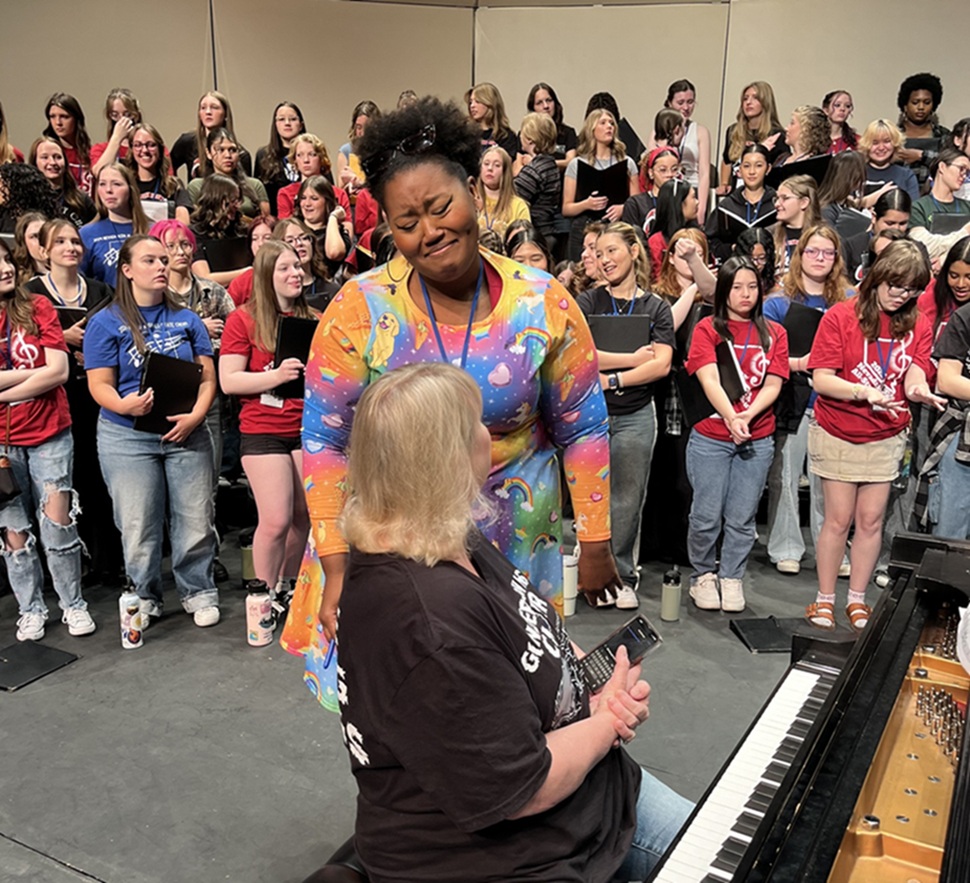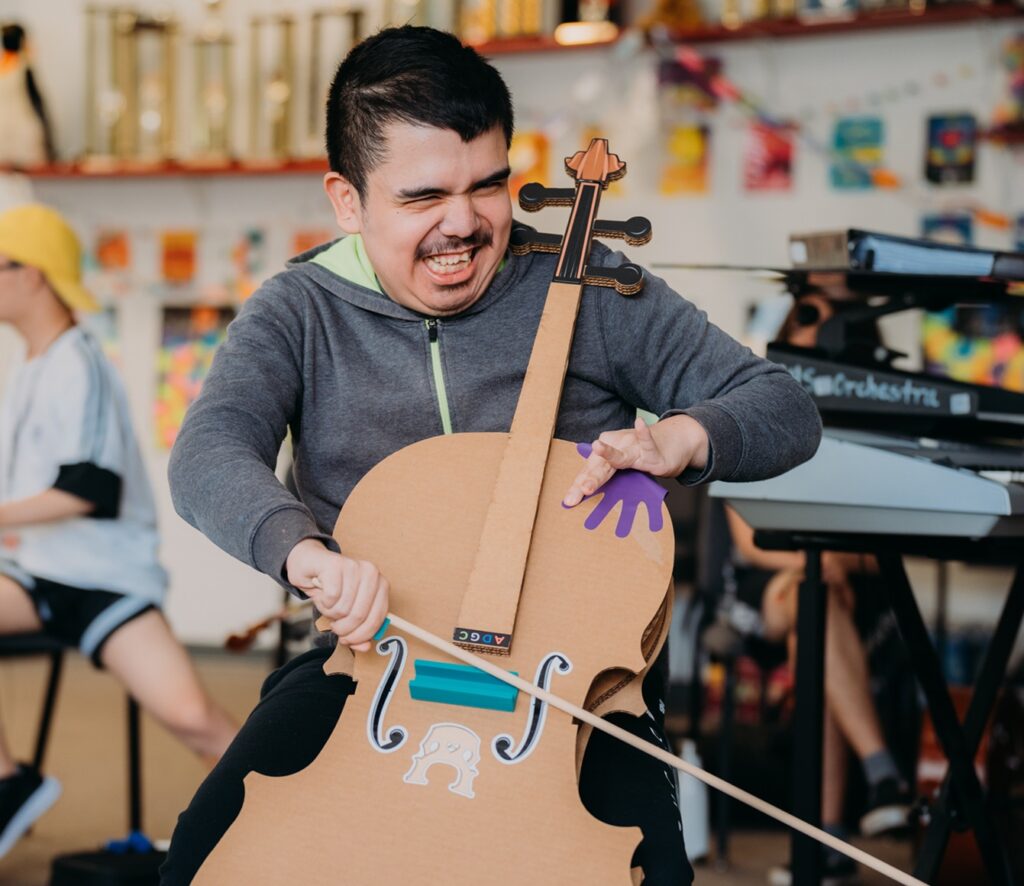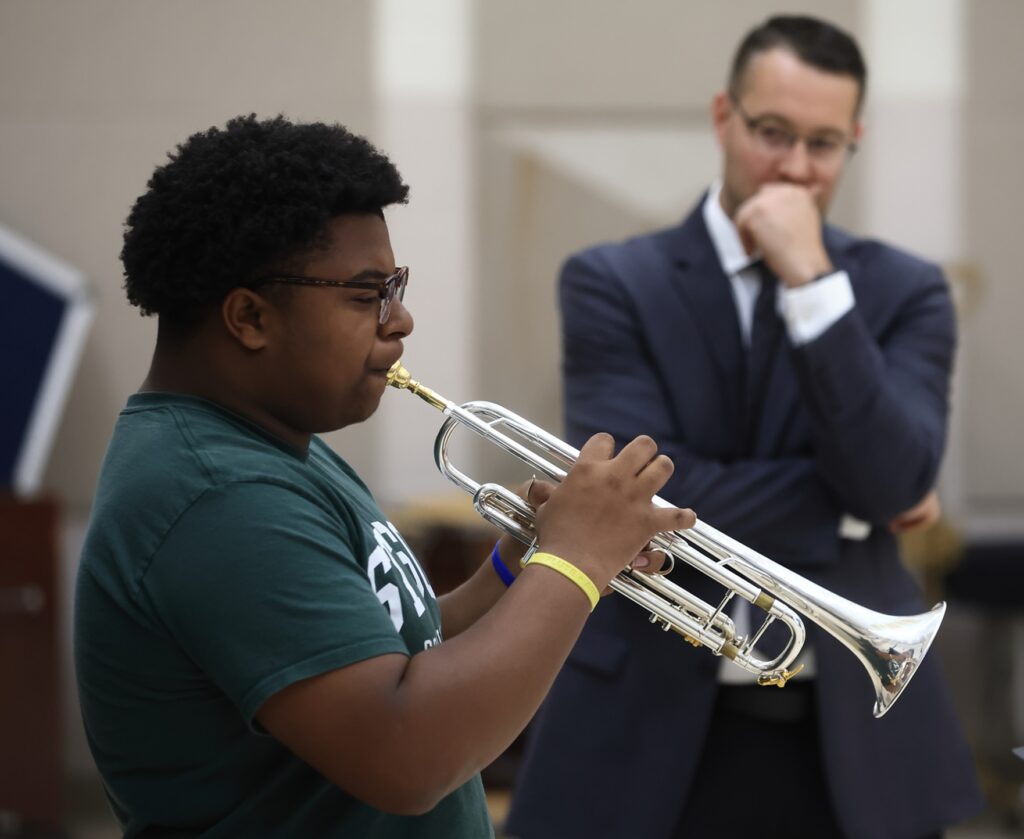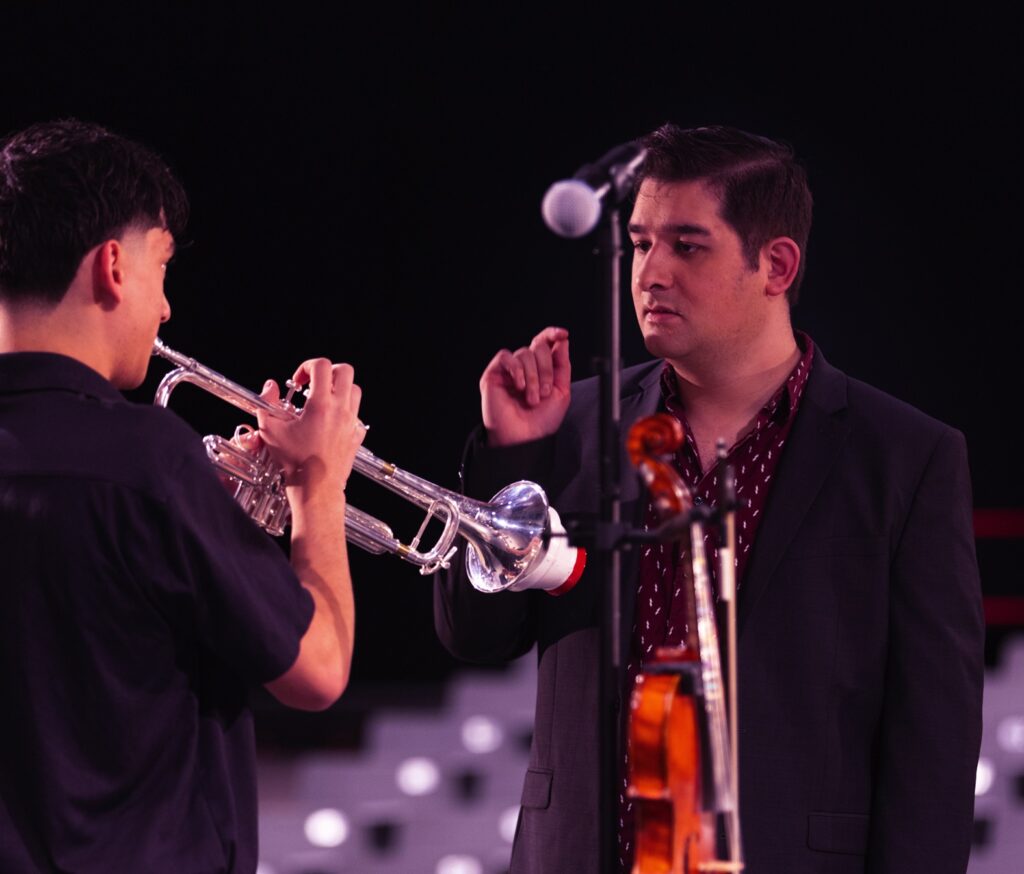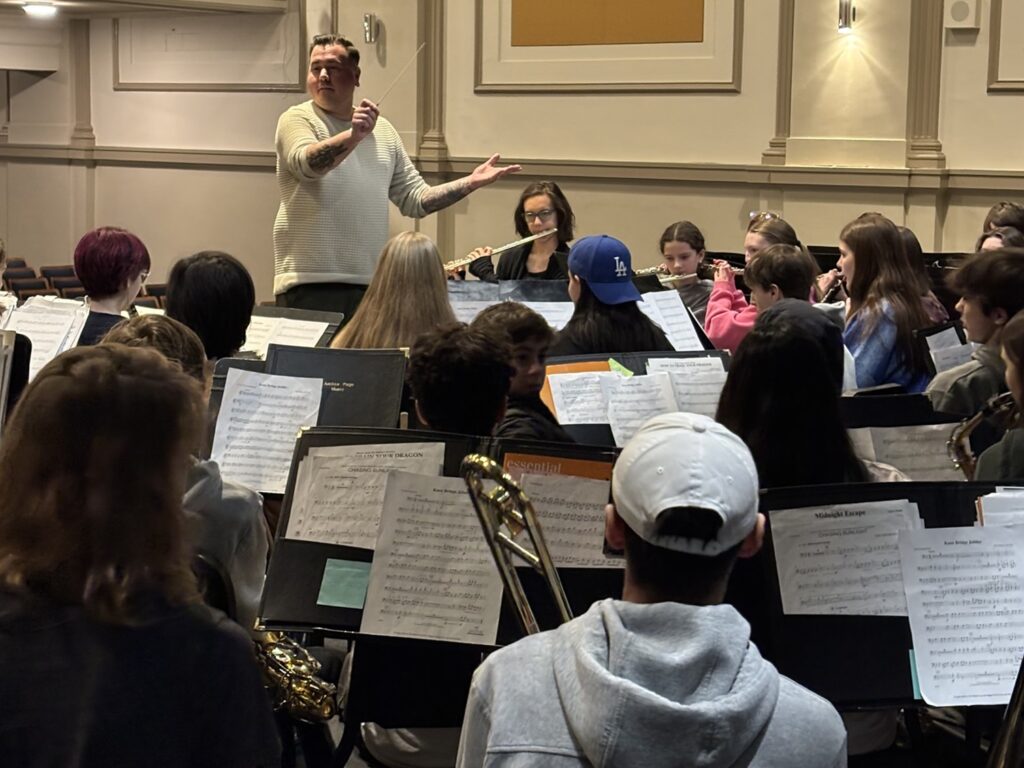Tagged Under:
Healing from Grief with Music
Taking a people-first approach has helped an Arkansas music educator help her students and herself deal with mental health and self-care.
When Kim Webb, Director of Bands at Greene County Tech School District in Paragould, Arkansas, was conducting the band’s 2019 graduation ceremony performance, she experienced a strange, haunting feeling inside. A voice in her head kept whispering, “I’m not supposed to be here.”
At the start of that school year, Webb — then the director of the middle school band — had expected that the high school’s director, Keith Dortch, would conduct the graduation performance, as he did every year. However, the entire Greene County community was shocked when, right before spring break, Dortch unexpectedly passed away.
This tragedy came a year before the COVID pandemic lockdowns, and just a year after the death of one of Webb’s students, a 7th-grader in her middle school band class.
Webb now recalls the 2019 graduation performance as “one of the hardest moments of the whole year.”
There was also another piece to the puzzle: Dortch’s death happened at the end of Webb’s maternity leave. While mourning the loss of a beloved colleague, she also had to balance raising her first child and ascending into a new role as the high school band director.
This hurricane of stress inspired Webb to reframe the way she approached teaching. “A lot of band directors can stand in front of their groups and think, ‘We’re just going to play this music,’” she says.
While her prior approach had been to focus on the music, her new philosophy included actively practicing empathy, being proactive about mental health and prioritizing community. “Seeing the shift of how people started caring about each other more … that helped our band program and our culture so much,” she says.
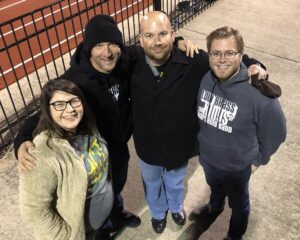
The Aftermath of a Tragedy
After dealing with multiple tragedies in her school district, Webb now has experience helping others get through both short-term and long-term grief. In the immediate aftermath of a tragedy, Webb focuses on helping the family with their current needs.
During her years working with Dortch, Webb also taught two of his sons. “He hired me. I was really close with his family,” she says.
Webb bought the family “grief groceries” — all the essentials so they wouldn’t have to worry about cooking or grocery shopping. After a trip to Wal-Mart, Webb delivered paper plates, frozen pizzas and other easy-to-prepare foods to the Dortch family.
To ease the long-term emotional burden of a tragedy, Webb periodically checks in with her students one-on-one. In 2018, when the middle school band mourned the loss of their 7th-grade classmate, Webb offered frequent support to this student’s closest friends. “One girl in particular was really close with the student who had passed,” Webb says. “I checked in on her from 7th grade until she graduated.”
The loss of Keith Dortch in 2019 led to program-wide changes that impacted the entire band, but Webb found ways to approach each student individually. “When the anniversary of his death was approaching, we’d check in on the kids,” she says. “I never wanted to address it head-on in front of the whole band. I had to keep in mind that his sons were in my band, too. They were already having to walk into a band room that felt like home because their dad had been the director.”
Before addressing this topic with her students, Webb pulled Dortch’s sons aside, gave them a heads-up about her plans for the day and excused them from class.

Self-Care is Necessary
Losing a loved one takes a huge emotional toll on everyone. Webb regularly reminds her students about the importance of taking care of themselves and prioritizing their mental health. “I always say, ‘I’m a band director, not a therapist. I’m here if you need to talk, but therapy is a huge thing that can help you,’” she says.
Reminding her students to practice self-care, both physically and mentally, has also motivated her to take care of her own mental health as a teacher. Webb says that if a teacher isn’t in a good mental state themselves, they won’t be able to help their students.
Sometimes, educators need to put their students’ emotional needs above their own. Webb experienced this at Dortch’s funeral. “I didn’t get to process my feelings because I was also there as the band director who was helping all these kids,” she says. “As the kids came in for visitation, I would meet them at the door and hug them. They needed to see a familiar face.”
After taking care of her students, though, Webb emphasizes the need for her own self-care. “You may be overwhelmed by other things, but you must take time for yourself,” she says. “Let yourself breathe. If you don’t, you’ll burn out and be in a dark place mentally. Then you can’t serve your students.”
Webb has personally found therapy to be a useful avenue for her own self-care. “A year later, when COVID hit, when I was no longer in overdrive, I remember sitting at home [and thinking], ‘I’m used to working, used to distracting myself. I need to take care of me,’” she says. “[That’s when] I started therapy.”
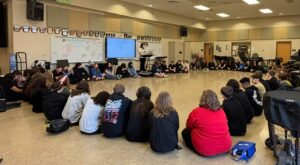
Mental-Health Awareness
In the years since losing members of her band community, Webb began to publicly speak about mental health awareness. She discussed the topic on two podcasts — Amro Music’s “After Hours” podcast for music educators, hosted by Nick Averwater, and her own podcast, “Beyond the Baton,” which she co-hosts with fellow Paragould music educator Nathan Anderson.
Additionally, Webb, who was recognized as a 2025 Yamaha “40 Under 40” music educator, has presented on the topic at conferences. “I was asked to be on a panel to talk about mental health in the classroom at our all-state convention because a lot of people were dealing with mental-health issues after [COVID],” she says.
While in therapy, Webb worked on talking more openly about her emotions, a skill she now uses. As mental-health practices have become less stigmatized over time, she has found it easier to broach emotional topics. “With my band director community, I really leaned into them to talk about certain situations and saying stuff out loud,” she says. “As band directors, we’re taking care of other people all the time.”

People First
This journey has caused Webb to realize that, as an educator, she’s first and foremost in the business of taking care of people. She is now more forgiving when her students request a break for their own mental health. “If you see a student struggling, it’s easy to push their feelings back,” she says. “While I don’t excuse kids from rehearsal every day, if they’re like, ‘Ms. Webb, I’m struggling,’ I’m more understanding now.”
If Webb notices that a student is having problems balancing their schoolwork with emotional issues, she might let them take one class period to sit in her office and decompress rather than participate in rehearsal.
Webb has also incorporated mindfulness techniques into her teaching style. “A couple weeks ago, when getting ready for regional assessment, I was like, ‘We’re meditating today!’” she says.
Using YouTube video tutorials, she sometimes incorporates five-minute meditations into her lessons, which can help students regroup and focus.

Webb has also passed this people-first philosophy onto her student leadership team. She tells her drum majors and section leaders to refer to Maslow’s Hierarchy of Needs. For example, instead of assuming that a student is being lazy, look for the cause of their behavior. “It may look like a student’s not getting something, or they’re frustrated, but you have to think about the person first,” she says. “You have to go down to the bottom of the hierarchy and try to figure it out. Maybe they may not have eaten today.”
Viewing her students and colleagues as people first has not decreased the efficiency or productivity of Webb’s rehearsals. It’s had the opposite effect. “When you transition to a people-first mentality, it makes your music rehearsals go better,” she says. “The culture in our band program is higher than it’s ever been.”










